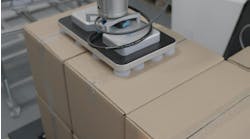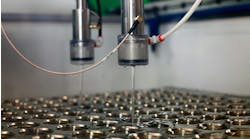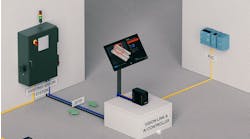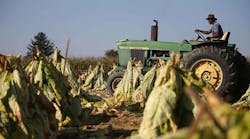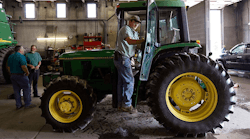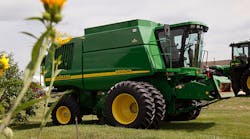Not in the market for a new tractor? Deere & Co. would like to sell you all the equipment to make your older one smart.
With slumping crop prices, the Moline, Illinois-based company is seeking to combat slowing sales by selling farmers bolt-on products -- modems, navigation devices, sensors and software. In the process, it’s joined the race for a "precision farming" market that could be worth $240 billion by 2050, according to Goldman Sachs Group Inc.
Deere’s AutoTrac system includes an auto-steering kit and a monitor that lets farmers set the most accurate course in fields for planting, applying fertilizer and pest control. It’s just one component of the company’s venture into the world of agriculture technology that promises growers less waste and reduced input costs as they deal with declining incomes.
“It’s an important topic for Deere, the industry and investors,” Larry De Maria, an analyst at William Blair & Co. in New York, said by phone. “Bigger and faster is no longer the mantra. It’s about productivity and efficiency.”
What’s notable about Deere’s technology offerings is that the company is taking an agnostic approach as to whether new devices are added to tractors made by competitors. On its website, the company touts that the AutoTrac Universal 200 package is available in a variety of colors -- not just Deere’s iconic green and yellow. That approach underscores how much the company’s fortunes are tied to the financial health of farmers.
Prices for corn, the biggest U.S. crop, are on pace for a fourth straight annual decline and reached a seven-year low of $3.1475 a bushel in Chicago last month. Futures traded at $3.345 on Friday.
In this environment, many growers aren’t willing to purchase new tractors that can cost around $360,000 and are either squeezing production out of existing equipment or turning to auctions for used tractors and combines that cost half as much. The slump for crop prices means analysts expect Deere’s profit for its fiscal year that ends next month will fall to the lowest since 2009.
Deere is moving toward a “holistic” strategy of selling parts that can be used on any machine already working fields, Ronald Zink, the company’s director of on-board applications, said in an interview in Chicago.
Productivity and efficiency have never been more important to farmers, Zink said. In some cases, that means that tractors built before GPS was a part of the world’s lexicon are getting an upgrade. Earlier this month, the company released an update to its Harvest Mobile application that can be used with older equipment. One function of the software allows farmers to gauge the performance of different seed varieties, which can help them make early planting decisions for the next season, he said.
Malthusian Problem
The increased use of technology can help agriculture overcome what Goldman deems a “problem of Malthusian proportions” -- an allusion to the scholar Thomas Malthus, who warned of food shortages because of population growth and diminishing arable land. Of course, even with a global population topping 7 billion, Malthus has yet to be proven right. Malthus died in 1834, three years before John Deere created the steel plow and founded the company bearing his name. In the almost 180 years that have followed, more powerful machinery coupled with seed technology and improved farming methods have allowed growers to collect ever-expanding grain harvests.
Crops can keep getting bigger as Deere, as well as competitors, place an emphasis on so-called variable-rate technology, a process that lets farmers know how much fertilizer, seed or crop protection to apply, when and where. That segment of precision farming has the most near-term momentum, according to Darryl Matthews, senior vice president at Trimble Navigation Ltd., a Sunnyvale, California-based technology company that said in August its farm data was integrated with Deere’s operation center.
Technology Push
The push into technology isn’t all smooth sailing for Deere. The Department of Justice last month struck a blow to the company’s agriculture technology efforts when it sued to block it’s purchase of Monsanto Co.’s Precision Planting LLC equipment business, saying it would eliminate competition and raise costs for farmers because Deere would control close to 90 percent of the U.S. market.
Zink declined to comment on the suit. Both companies said they would contest it, arguing the combination will benefit farmers.
Even as competition heats up, it’s unlikely to deter companies from making a bigger push into the industry. Trimble estimates 32 percent of U.S. farms use some form of variable-rate technology and that 48 percent will employ it in the next two years. At the same time, companies such as Tel Aviv-based Prospera are focusing on tools that allow growers to monitor the health of their land and crops in real-time. In July, it received a $7 million investment, led by Bessemer Venture Partners LP.
The move to more technology is “going to grow fast for awhile,” said Karen Ubelhart, an analyst at Bloomberg Intelligence in New York. “We’re in the early stages of this digital industrial” era, she said.

